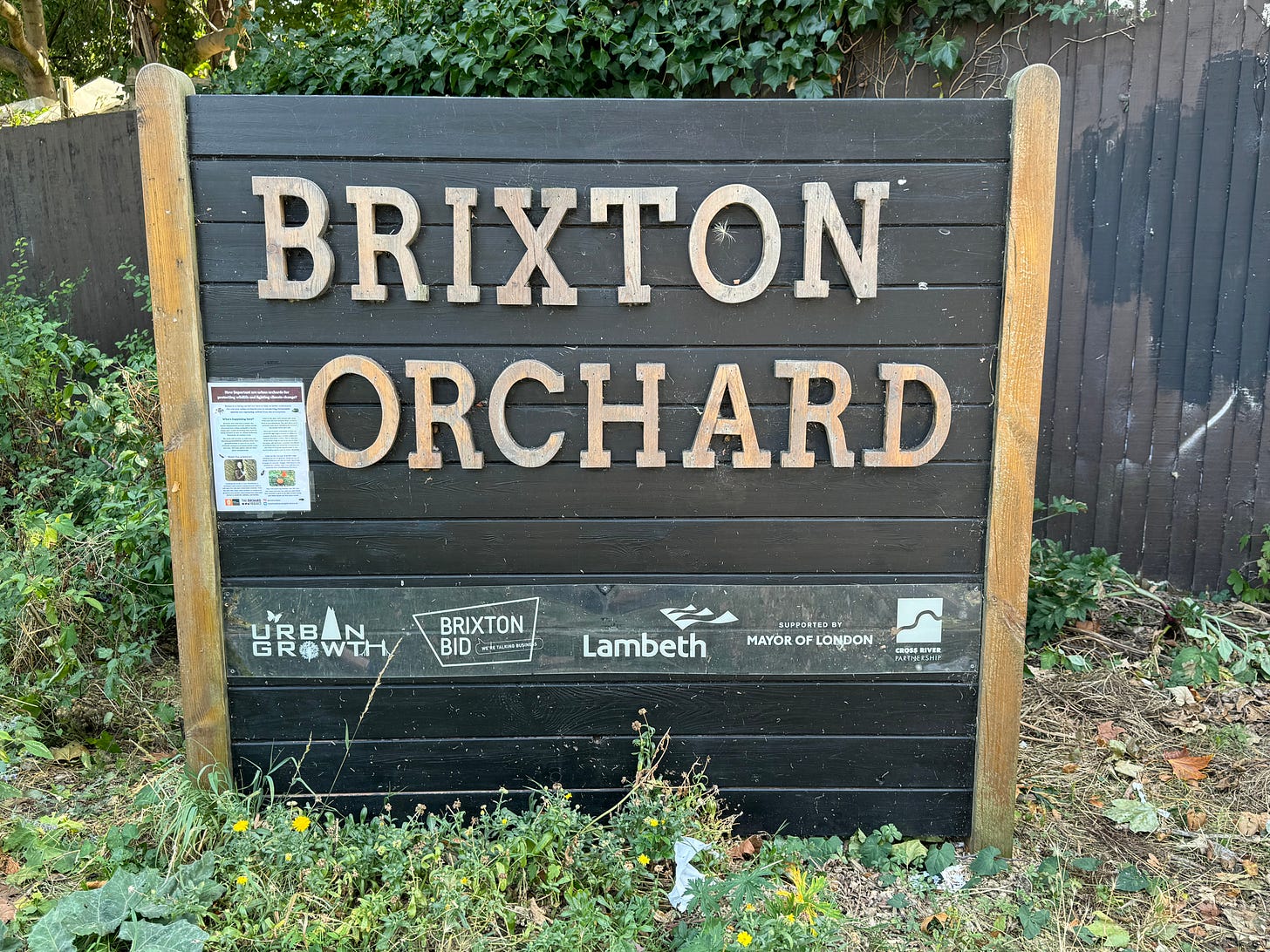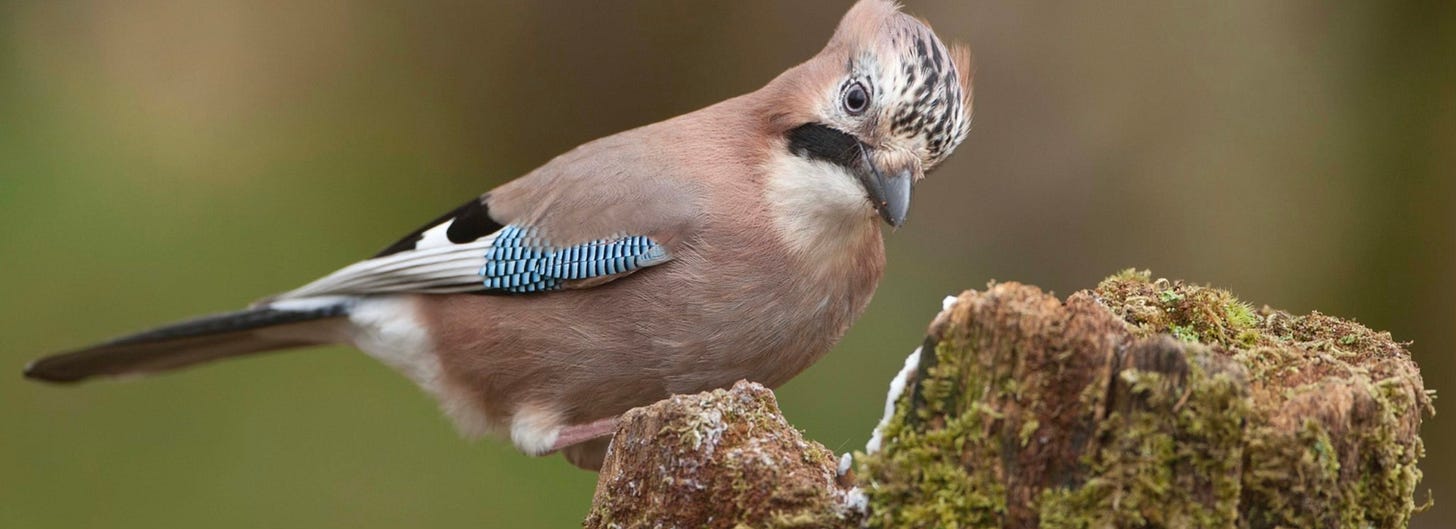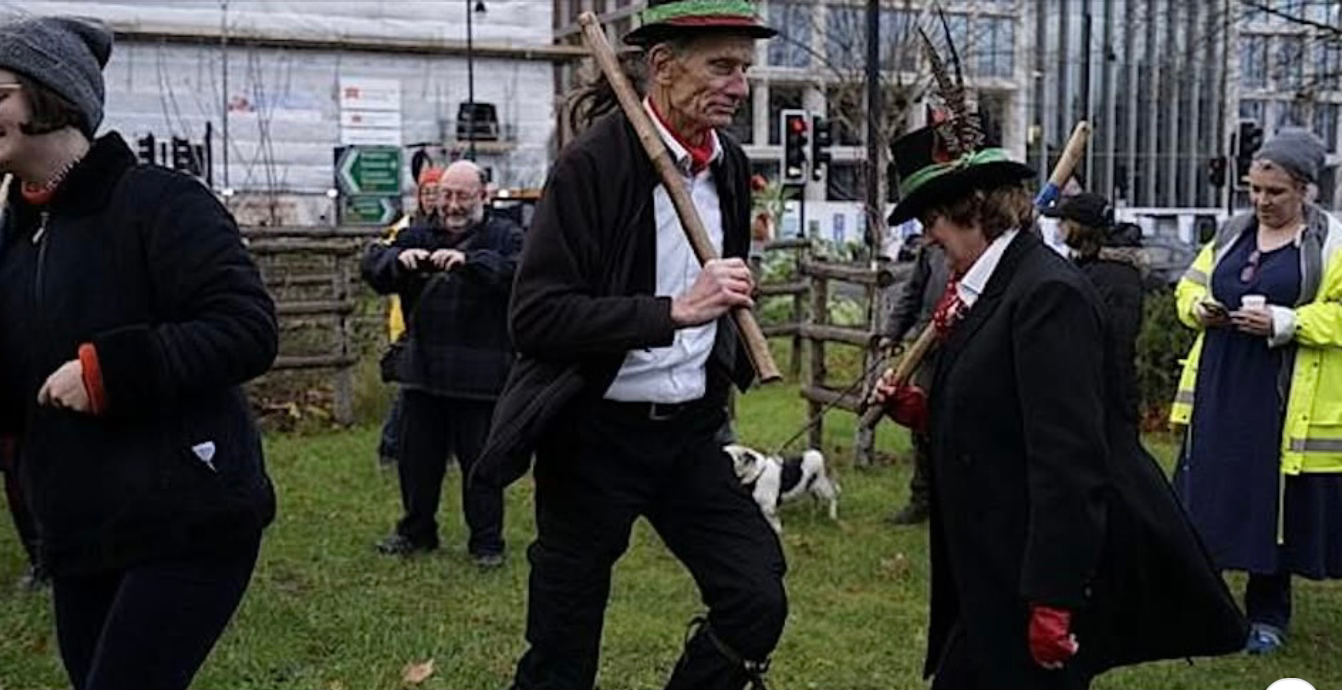Brixton’s orchard
A celebration of my neighbourhood's human and bio diversity
I moved into my flat in 2019.
I was pretty deaf to nature at that point in my life. But I was not deaf to the sound of birdsong that spring.
I do not live in bucolic Britain. I am about as far away from the countryside as it is possible to be, in gritty grimy London, above one of the most polluted road junctions in the country.
The birdsong was coming from a small parcel of land opposite from me. A bird was singing its heart out day and night looking for a mate, over the sound of constant traffic.
It turns out this is nothing new. In fact it has been going on for more than a hundred years in London.
Even at the end of the 19th century, the effect of human presence on bird song was being observed and commented on .
Here is the poet Edward Thomas who grew up in Clapham just a couple of miles away in his poem ‘Good-night’:
“I can hear no more those suburb nightingales;
Thrushes and blackbirds sing in the garden of the town
In vain: the noise of man, beast, and machine prevails”
The denizens of the Orchard
It turned out that the parcel of land under the bedroom window where the singing was coming from was called Brixton Orchard.
It stands on top of a former nuclear bunker that had played host to some truly ‘underground’ raves in the 90s.
Ten years ago it was turned over to the community.
Every type of tree got planted on this pocket square of land - damsons, quinces, plums, medlars, apples, pears, mulberries - you name it.
And every Thursday an army of volunteers pitches up, come rain or shine to keep everything in trim.
The Orchard plays host to dog-walkers and picnicking families.
But it also serves as a refuge to the sorts of people that reflect the make-up and pressures of this diverse urban community.
Summer time and the living is not so easy
Last year during a heat wave a heavily pregnant woman took up residence amidst the plum and crab apple trees.
The presence of her many suitcases hinted at a rapid departure and domestic abuse.
Concerned neighbours tried to help but she refused to leave.
She felt safer there than where she had come from.
One day she collapsed in the heat and an ambulance was fetched but she took some persuading to go to hospital.
This year it’s been the turn of sex workers to make their home in the Orchard. They often use it in broad daylight, literally yards from the busy A23 that heads down to Brighton.
But all that doesn’t seem to faze the wildlife who see it as their home too.
The bugs have found the hotel built for them amongst the rotting stumps.
And the bees have come to the blossoms. Sometimes a little too enthusiastically.
Once a swarm came across the road close to the entrance to our flats. We found a local bee-keeper to smoke them into insensibility. They were then packed off to a safer place with their queen.
The fruits of the fall
Come the autumn, the unused fruits from the Orchard are too good to be left behind.
Just a few weeks ago I watched a jay who flitted in each day when no-one was about to mop up the leftovers.
One of the more retiring covid, you don’t see jays very often this close to the centre of London.
Less shy is a grey squirrel that uses the Orchard as a staging post to get across three lanes of traffic to the churchyard opposite.
No doubt that’s where their cached acorns are stashed.
It appears to have sussed the phasing of the traffic lights. But I can’t help thinking that might not have been a successful long term strategy.
The BBC and my bird feeder
Come to think of it, this may have been the same squirrel that plagued my bird feeder.
During one of the lockdowns I had done my bit for wildlife by hanging one up from one of the trees.
I have to confess it was not an entirely altruistic act on my part. I found that I could position myself on the balcony with my binoculars and safely observe the birds it attracted there.
The squirrels monopolised it at first. But with a little adaptation I eventually found I could keep them out. However I never succeeded with the parakeets.
They are able to almost double-joint their legs to avoid triggering the weight sensitive mechanism that should slam the feeder shut.
Like many I am in two minds about these birds. On the one hand they are a colourful addition to London. But they do empty out the feeder in short order.
The BBC became as interested in my bird feeder as the wildlife were.
The urban setting and community focus of the Orchard got a fair degree of media coverage during the lockdowns.
I was one of a number of volunteers that were featured for a BBC Earth film.


I was even button-holed once with my shopping bags by a crew from Radio Four that wanted an urban rewilding angle for their ‘Open Country’ series.
It appeared the background hum of traffic made a contrast to the idyllic sounds of the countryside that normally featured on its early morning slot on Radio 4.
A winter wassail
Last January there was what I think is the most joyous human celebration of the Orchard, the January wassail led by Brixton’s very own Morris dancers.
The Brixton Tatterjacks were be centre stage. We tie ribbons round the fruit trees and then toast each in turn to wish them success for the coming year.
It’s unclear if it will be happening this time round. But if it is I’ll be there to celebrate the trees. But I’ll also be toasting all the birds, bugs and other assorted wildlife that have made their home in the Orchard to ensure they are not forgotten.





This is glorious Mark, and has put a spring and several wild tweets into my own urban morning.